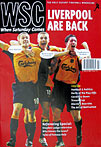 Boavista, the second club in Porto, have broken the domination of Portugal's big three. Phil Town tries to work out how they did it
Boavista, the second club in Porto, have broken the domination of Portugal's big three. Phil Town tries to work out how they did it
The old David and Goliath cliche was wheeled out for some heavy use by newspapers, TV and radio stations to describe Boavista’s title triumph, but it was a cliche well employed. Boavista are indeed dwarfed by the big three of Benfica, Sporting and Porto. In the week before the game against Aves which decided the title, Boavista proudly announced that their subscription-paying fan base had risen to a club record 15,000. This compares to Porto’s 60,000, Sporting’s 80,000 and Benfica’s whopping 115,000. Those three clubs had budgets for this season of £25 million, £20 million and £25 million respectively. Boavista’s was £4.5 million, of which just £1 million was spent on players.
The gulf has always been thus; it’s 55 years since anyone else won the title – Belenenses in 1946 – and that was the only time until this year that any other team had done so. So how exactly did David bring down the Três Golias? It starts at the top. The 37-year-old club president João Loureiro, a former rock singer, is a model of rigour and seriousness. Budgets are there to be kept to, players’ salaries are reined in and the management of resources has been highly efficient.
As always, the club had to sell a name in the close season to balance the books. In the past they’ve sold João Pinto, Jimmy Hasselbaink and Nuno Gomes. This time it was full-back Mário Silva to Nantes. In turn, the squad was reinforced very shrewdly with several players who cost little or nothing, such as hard midfielder Petit (called up to the national team this year) and Brazilian winger Duda.
There is strength in depth – at least two solid players for every position – no prima donnas and um bom balneário (a good dressing room, meaning team spirit is strong). And there are some outstanding players, such as no-nonsense Ricardo in goal – the defence conceded just 18 goals all season until Porto spoiled their record with four in the last match. The captain Litos is a warrior of a central defender, complementing the sublime Bolivian playmaker Erwin Sanchez and the lightning-quick winger Martelinho (“Little Hammer”). Goals come from everywhere. Boavista were the second most prolific team in the league with 63, but the two top scorers, Silva and Duda, barely broke into double figures.
At the coaching helm is a bionic pixie of a man, Jaime Pacheco. His geniality conceals a soul driven by feverish desire. The team were 3-0 up and coasting in the vital game against Aves when Petit hobbled over to the dugout to get a sponge. Pacheco snatched it out of his hand, screaming at him to get back out there and play. In training, shinpads are compulsory. This combative philosophy is reflected in Boavista’s suffocating pressing game which has won few purist friends but many points (only three defeats all season).
Those who begrudge Boavista the title point to the curious fragility of Porto, the unexpected feebleness of last year’s champions Sporting and the mess that is Benfica (this was the worst season in the club’s history). There is perhaps a grain of truth in this but, on the other hand, there are many here who are holding Boavista up as a shining example of how rigour and humility at all levels of a club can breed success.
And there’s a general feeling that given the excellent seasons of other relative minnows (Sporting Braga and Belenenses, for example), the first season of the new millennium may go down as a watershed. Perhaps it won’t be 55 years this time before a David brings the Goliaths down once again.
From WSC 173 July 2001. What was happening this month